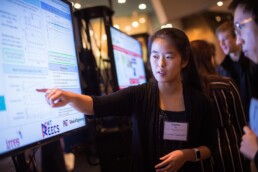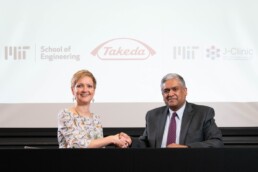At halfway point, SuperUROP scholars share their research results
In a lively poster session, more than 100 undergraduates discuss their yearlong research projects on everything from machine learning to political geography.
MIT undergraduates are rolling up their sleeves to address major problems in the world, conducting research on topics ranging from nursing care to money laundering to the spread of misinformation about climate change — work highlighted at the most recent SuperUROP Showcase.
The event, which took place on the Charles M. Vest Student Street in the Stata Center in December 2019, marked the halfway point in the Advanced Undergraduate Research Opportunities Program (better known as “SuperUROP”). The yearlong program gives MIT students firsthand experience in conducting research with close faculty mentorship. Many participants receive scholar titles recognizing the program’s industry sponsors, individual donors, and other contributors.
This year, 102 students participated in SuperUROP, with many of their projects focused on applying computer science technologies, such as machine learning, to challenges in fields ranging from robotics to health care. Almost all presented posters of their work at the December showcase, explaining research to fellow students, faculty members, alumni, sponsors, and other guests.
MIT School of Engineering and Takeda join to advance research in artificial intelligence and health
A key part of J-Clinic, the MIT-Takeda Program will create educational opportunities and support cutting-edge research to positively impact human health.
MIT’s School of Engineering and Takeda Pharmaceuticals Company Limited today announced the MIT-Takeda Program to fuel the development and application of artificial intelligence (AI) capabilities to benefit human health and drug development. Centered within the Abdul Latif Jameel Clinic for Machine Learning in Health (J-Clinic), the new program will leverage the combined expertise of both organizations, and is supported by Takeda’s three-year investment (with the potential for a two-year extension).
This new collaboration will provide MIT with extraordinary access to pharmaceutical infrastructure and expertise, and will help to focus work on challenges with lasting, practical impact. A new educational program offered through J-Clinic will provide Takeda with the ability to learn from and engage with some of MIT's sharpest and most curious minds, and offer insight into the advances that will help shape the health care industry of tomorrow.
“We are thrilled to create this collaboration with Takeda,” says Anantha Chandrakasan, dean of MIT’s School of Engineering. “The MIT-Takeda Program will build a community dedicated to the next generation of AI and system-level breakthroughs that aim to advance healthcare around the globe.”

